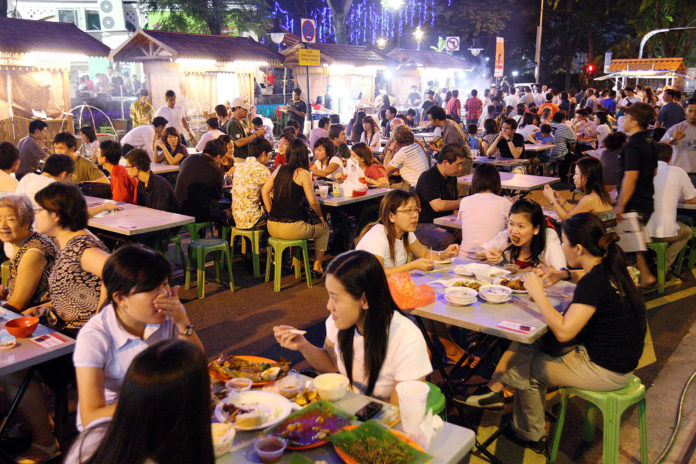Eating late at night could cause several health problems including weight gain and increase in insulin and cholesterol levels, show the initial results of an ongoing study.
According to a recent study, eating the last meal of the day before 7 p.m. could help you stay in better health.
“We know from our sleep loss studies that when you’re sleep deprived, it negatively affects weight and metabolism in part due to late night eating, but now these early findings, which control for sleep, give a more comprehensive picture of the benefits of eating earlier in the day,” said lead author of the ongoing study Namni Goel, Research Associate Professor, Perelman School of Medicine at the University of Pennsylvania in the US.
In the study, nine healthy weight adults underwent two conditions, one of daytime eating, three meals and two snacks between 8 a.m. and 7 p.m., for eight weeks and another of delayed eating ,three meals and two snacks eating from noon to 11 p.m, for eight weeks.
There was a two week washout period between conditions to make sure there was no carry over effect. The sleep period was held constant, between 11 p.m. to 9 a.m. The team found that when participants ate later, compared to the daytime condition, weight increased.
According to a research published online on Cell Press Selections, maintaining timely meal times is important to regulate the body clock. This 24 hour clock is controlled by the brain and other bodily processes and is known to get affected by light and darkness. The study suggests that meal time can reset or tweak this clock.
Findings provide first experimental evidence of prolonged delayed eating versus daytime eating, showing that delayed eating can also raise insulin, fasting glucose, cholesterol, and triglyceride level.
The researchers also found that eating earlier may help prevent overeating in the evening and at night.
Experts across the globe stress on the importance of timely meals. Skipping meals or delaying them is known to have adverse impact on our body.
Working late nights frequently interferes with the body’s natural rhythms, causing gastrointestinal problems, appetite changes and significant weight loss or gain.
The key to healthy eating in a late night job is to establish a meal schedule that fits your day, whatever the hours. Avoid fatty, salty foods and sugary soft drinks. Stick to filling, healthy foods that won’t weigh you down and nix liquid calories by drinking water. Working late nights doesn’t have to mean weight gain.
Respiratory quotient, the ratio of carbon dioxide produced by the body to oxygen consumed by the body that indicates which macronutrients are being metabolised, also rose during the delayed eating condition, indicating later eating led to metabolising fewer lipids and more carbs.
The new findings, scheduled to be presented at SLEEP 2017, the 31st annual meeting of the Associated Professional Sleep Societies LLC (APSS) in Boston, offer experimental evidence on the metabolic consequences of consistent delayed eating compared to daytime eating.
Breakfast has long been touted as the king of all meals. In fact, many diet experts have hypothesized it’s the most important meal of the day. Timing meals later at night can cause weight gain and impair ‘Fat Metabolism’.
Breakfast
No matter what time you get up, eat a healthy meal to kick-start your metabolism. Go for a light, healthy breakfast of whole grains, such as bran cereal, oatmeal or wheat toast, fresh fruit, fruit juice and low fat dairy products. If you need something more substantial, add scrambled egg whites or lean turkey bacon. Skip fried foods and sugary cereals at breakfast; they have no nutritional value and will only weigh you down. Have coffee if you like but nix extra sugar and milk.
Lunch
Lunch should be a late-night worker’s main meal and the one that provides the most calories. Eat sensibly to provide your body with a steady flow of energy that lasts halfway through your shift. Choose a light protein, such as grilled chicken, veal or tuna. Pair it with vegetables and healthy carbohydrates, such as plain baked or boiled potatoes and whole-wheat pasta or bread. Add a small, light dessert if you wish. Caffeine is permissible at this meal, but watch your sugar intake: Too much and you can find yourself crashing and eating more before you even leave for work.
Dinner
If you work late nights, you probably eat dinner on the job. Avoid pre-packaged frozen foods and vending machine treats, which pack on pounds via excess carbs, sugar and sodium. Bring a meal that is easy to digest and won’t sit heavily on your stomach. Skip fried foods, rich desserts, spicy foods, red meat, butter and fat. Instead, go with a light meal of poultry or fish paired with fresh or roasted vegetables. Do not add salt to your food. Have water with your meal, not soda. Soups, salads and sandwiches are other options, provided you keep fat and sodium content to a minimum. Replace full fat salad dressings with olive oil and vinegar or a fat-free dressing.
Snacks
Avoid caffeine during the last half of your shift. If you need a snack on the job, try healthy foods such as dried fruit, nuts, popcorn, baked crackers and cereal. Pack your snacks before you leave, but don’t eat them until your stomach is growling. That will let you know that you are truly hungry and not just bored. After work and before you go to sleep, eat a light snack that is high in carbohydrates, such as toast with jam or breakfast cereal.
Kelly Allison, PhD, an associate professor of psychology in Psychiatry and director of the Center for Weight and Eating Disorders, and senior author on the study. “We have an extensive knowledge of how overeating affects health and body weight, but now we have a better understanding of how our body processes foods at different times of day over a long period of time.”



























